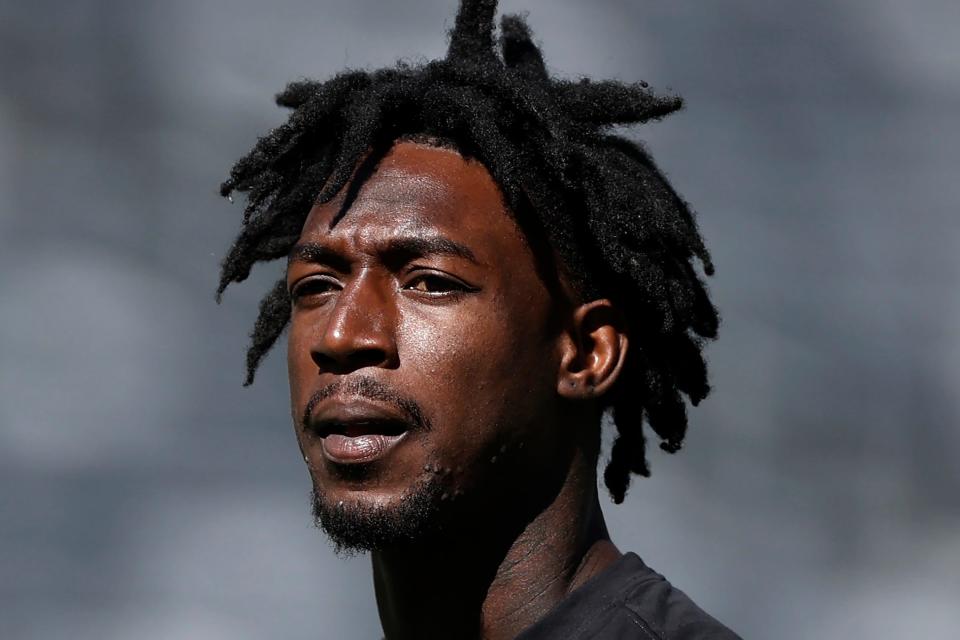Suspending Calvin Ridley for betting on games also reflects poorly on NFL | Opinion
What on earth would have made Calvin Ridley think it was OK for him to bet on NFL games?
A peek at the Atlanta Falcons’ 2022 away games, one of which will be played at the Caesars Superdome? A glance at the NFL’s website, where there is a tab that takes you to an entire website devoted to fantasy football? Or was it seeing those ads for sports books that have become ubiquitous during games and every other NFL-related program?
The aforementioned Caesars – which runs ads featuring the entire Manning family, the NFL’s equivalent of a papal benediction. FanDuel. DraftKings. PointsBet. The NFL and individual teams have partnered with so many sports books and casinos over the past few years, adding millions to their already robust bottom lines, that it’s hard to keep them all straight.
"There is nothing more fundamental to the NFL's success – and to the reputation of everyone associated with our league – than upholding the integrity of the game,” commissioner Roger Goodell told Ridley sternly in a letter notifying the Falcons wide receiver of his minimum one-year suspension, which the NFL announced Monday afternoon.
NFL'S COMPLICATED HISTORY WITH GAMBLING: From Paul Hornung and Art Schlichter to Calvin Ridley
MORE: How Calvin Ridley got caught betting on NFL games

“Your actions put the integrity of the game at risk, threatened to damage public confidence in professional football and potentially undermined the reputations of your fellow players throughout the NFL.”
No different than the league did when it dismantled the firewall against the gaming industry that it had so staunchly defended for decades because there was lots of money to be had. Not that the NFL will ever acknowledge exactly how much those deals are worth, of course.
This is not meant to excuse Ridley, particularly if he bet on the Falcons – and the NFL was quick to share that he had. Nor is this a call to remove the remaining guardrails that ensure the NFL continues to be a legitimate sport rather than the gridiron version of the WWE.
But the indignation from Goodell, and the NFL’s willingness to spill the details of Ridley’s misdeeds, are just a wee bit sanctimonious given the league has no problem cozying up to the gaming industry when it suits it. The NFL wants to claim it’s not directly involved in anything unsavory – like gambling on NFL games, say – but will happily take the cash that unsavory business generates from “other people.”
NFL COMBINE WINNERS, LOSERS: Jordan Davis, Ahmad Gardner among biggest draft standouts
That distinction only exists in the minds of the NFL, though. To everyone else, the league is an active and enthusiastic partner of the entire betting industry. As sports betting becomes increasingly legal, and even more widely accepted, across the United States, it might be a surprise that an active player would cross that once-bright line to bet on games but it hardly comes as a shock.
“When we as a league encourage everyone to bet on our games, advertise betting on our players’ game stats, take in big money from gambling sites & do everything we can to get our young people to embrace gambling – we can’t be surprised when this happens,” Tony Dungy, the Hall of Fame coach who is now an analyst for NBC Sports, said on Twitter.
I get it too Andrew. But when we as a league encourage everyone to bet on our games, advertise betting on our players’ game stats, take in big money from gambling sites & do everything we can to get our young people to embrace gambling—We can’t be surprised when this happens. https://t.co/Yhn4MwTiaL
— Tony Dungy (@TonyDungy) March 7, 2022
Ridley used a mobile device to place longshot three-, five- and eight-game parlays through the Hard Rock Sportsbook in late November, a person with direct knowledge of the situation told Lance Pugmire of USA TODAY Sports+.
That would be the same Hard Rock that has the naming rights to the Miami Dolphins’ stadium. And the Dolphins are owned by Stephen Ross, who was accused in a lawsuit by former coach Brian Flores of offering him money to lose games.
Ross has denied the allegations, vigorously. But this kind of seediness is what the NFL invited when it decided to embrace the gaming industry after the Supreme Court struck down the federal ban on sports betting in 2018.
The NFL says its use of Genius Sports, which monitors betting activity, ensures that the league will stay above reproach. It was Genius Sports that tipped off the league about Ridley’s bets.
But the league hasn’t said how much its deals with betting companies are worth. Is it $10 million a year? $1 billion? It’s a relevant question. The more zeroes involved, the harder it's going to be to maintain integrity.
The NFL thought it could take the betting industry's money and somehow not get tainted by it. That was always going to be a gamble.
Follow USA TODAY Sports columnist Nancy Armour on Twitter @nrarmour.
This article originally appeared on USA TODAY: Suspending Calvin Ridley for betting on games reflects poorly on NFL

